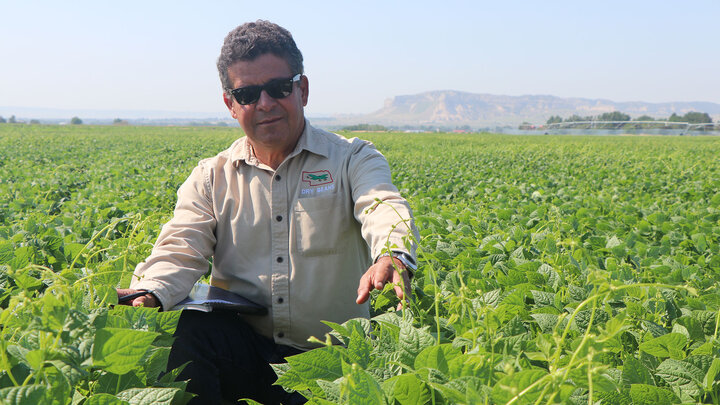Carlos Urrea, associate professor of agronomy and horticulture and dry bean breeding specialist at the Panhandle Research and Extension Center in Scottsbluff, was selected to write a summary about his Journal of Plant Registrations article, “Release of drought tolerant pinto SB-DT2 and small red SB-DT3 common bean germplasm from a shuttle breeding program between Nebraska and Puerto Rico” for publication in the April issue of CSA News magazine.
CSA News is the official magazine for members of the American Society of Agronomy, Crop Science Society of America and Soil Science Society of America, featuring research highlights; member news, science policy, and meetings news; and career and education information.
Urrea explains that drought is the single largest constraint to common bean (Phaseolus vulgaris L.) production worldwide and is expected to become more prevalent as temperatures increase and precipitation patterns change. Thus, breeding for drought tolerance in conjunction with resistance to multiple diseases is a vital breeding strategy for improving climate resilience in common bean.
He writes in the Journal of Plant Registrations article, that researchers in Nebraska and Puerto Rico report two germplasm releases resulting from an ongoing shuttle-breeding program that focuses on identifying unique germplasm with abiotic stress tolerance and introgressing those traits into important common bean market classes to increase their drought tolerance and genetic diversity.
These new germplasm lines (pinto SB-DT2 and small red SB-DT3) are promising sources of drought tolerance based on their high yield, upright architecture (suitable for mechanized harvesting), and broad adaptation to temperate and tropical environments. Both SB-DT2 and SB-DT3 showed resistance to endemic strains of the rust pathogen, and SB-DT2 showed resistance to bean common mosaic virus.
These germplasm lines can be used in common bean-breeding programs to introgress novel drought tolerance into pinto (SB-DT2) and small red (SB-DT3) market classes to improve their climate resilience.
See summary in CSA News.
Urrea earned a Bachelor of Science in agronomy from the National University of Colombia, a Master of Science in agronomy from the University of Puerto Rico and a doctorate in plant breeding and genetics, with a minor in statistics, from North Dakota State University. He has been working for the University of Nebraska–Lincoln for 17 years and his publication credits include more than 60 papers published in peer-reviewed journals and two book chapters.
His program’s primary goal is breeding better bean varieties for Nebraska, one of the nation’s leading bean-producing states. Urrea’s research focuses on developing well-adapted dry bean and chickpea cultivars/germplasm with high yield potential, multiple disease resistance, water use efficiency and desirable agronomic characteristics to enhance the sustainability and competitiveness of the Nebraska dry bean industry. These breeding efforts are ongoing and involve six different market classes.




